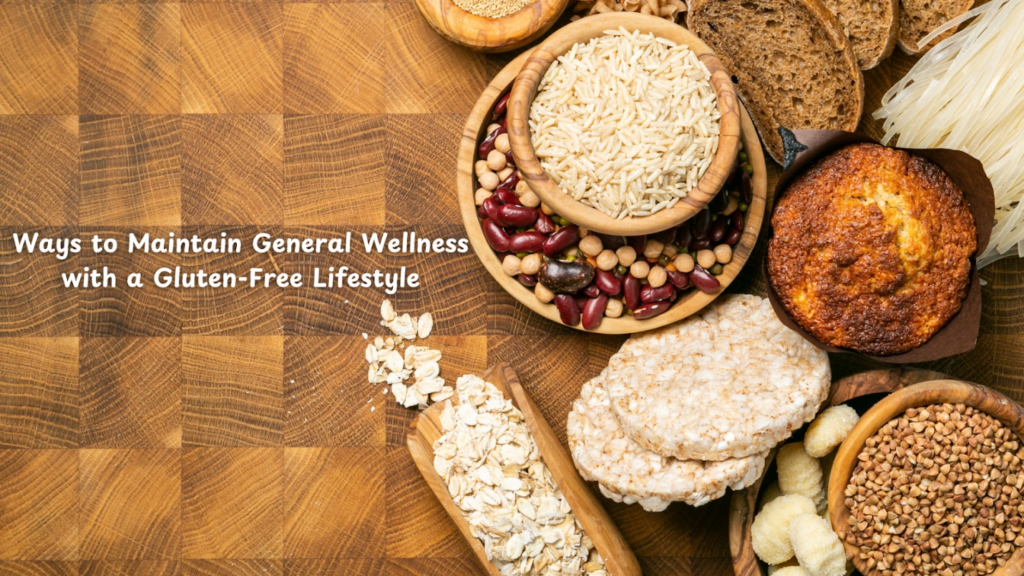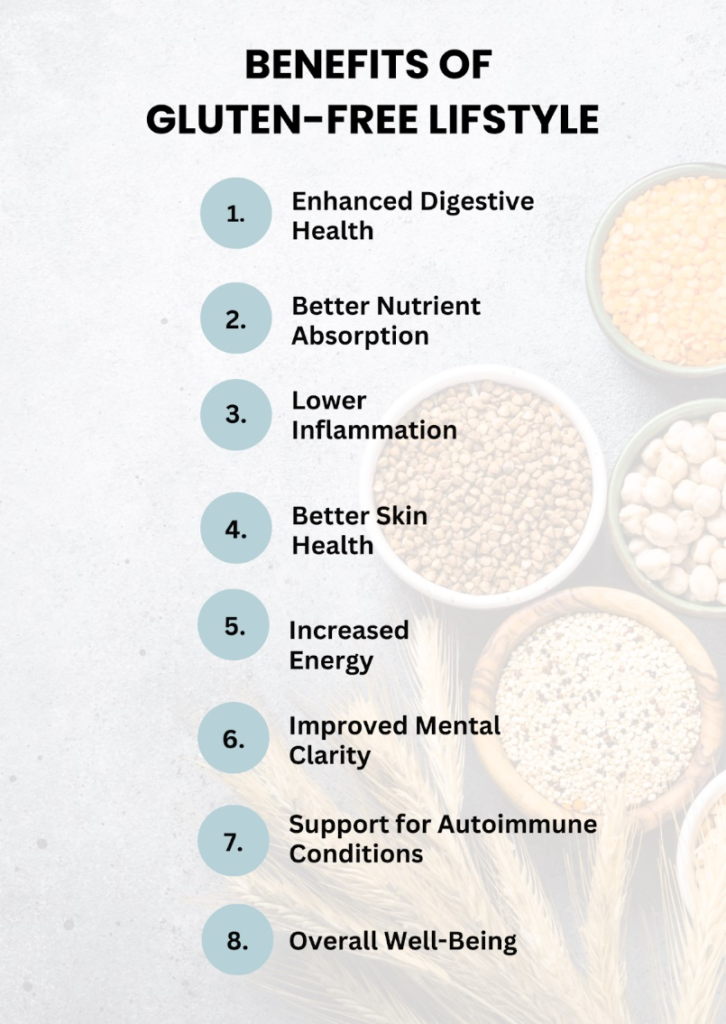
Do you frequently experience bloating, low energy levels, or brain fog? Many people live with symptoms like these without understanding their origin. Gluten sensitivity symptoms may be a contributing factor to the said issues in some individuals.
Living gluten-free can help you feel better, alleviate these issues, and support overall well-being. It’s also about health optimization. Here is how you can ensure general wellness while leading a gluten-free life.
Table of Contents
What Is Gluten?
Gluten is a kind of protein found in wheat, barley, and rye. It confers the elastic properties of dough, by which bread can rise and then hold a shape.
Gluten gives bread, pasta, and pizza their chewy texture. Gluten itself isn’t harmful to most of us. However, people who are gluten intolerant or have a condition named celiac disease shouldn’t include this ingredient due to some adverse health reactions.
1. Prioritizing Nutrient-Dense, Gluten-Free Foods
Wholesome food is at the centerpiece of any healthy diet, and this includes all foods or food groups, whether gluten-free or not. Emphasis will be needed on naturally gluten-free options that carry weighty nutritional values in a gluten-free lifestyle.
- This will involve fruits and vegetables for vitamins, minerals, and antioxidants.
- Lean proteins like chicken, fish, and eggs, or plant-based proteins such as legumes.
- Gluten-free grains like quinoa, brown rice, amaranth, and buckwheat.
- Healthy fats from sources like avocados, nuts, seeds, and olive oil.
The advice is more important when one is on a gluten-free diet. You will not only be eliminating gluten from the body by opting for whole foods and unprocessed foods, but you will also be adding much-needed vital nourishment to the body.
For added convenience and consistency, gluten free diet meal delivery services can help ensure you steer clear of processed foods high in sugar and unhealthy fats, support a varied intake of nutrient-dense foods, and save time in meal preparation.
2. Balancing Macronutrients for Sustained Energy
A balanced diet means a lot more than the absence of gluten; one needs to have an adequate balance of the sources of macronutrients. In proper balance, they help the body maintain energy levels to keep your daily activities going.
Not only will this keep you at a much more constant energy level throughout the day, but overall health will also be maintained, which will help your gluten-free diet to be nutritious and satisfying.
Gluten-Free Macronutrient Sources
| Macronutrient | Gluten-Free Sources | Benefits |
| Proteins | Eggs, fish, chicken, tofu, legumes | Muscle repair, satiety |
| Fats | Avocados, nuts, seeds, olive oil | Energy, hormone balance |
| Carbohydrates | Quinoa, brown rice, fruits, vegetables | Sustained energy, fiber |
Including a variety of these foods in your diet ensures you get a broad spectrum of nutrients while avoiding gluten.
3. Supplements to Support Gluten-Free Wellness
Even on a very well-planned diet, nutrient gaps are most likely to persist in some form or another; supplements are key regarding overall health. Common nutrient deficiencies in gluten-free diets include iron, calcium, fiber, B vitamins (including B12), and vitamin D.
Several supplements can help fill in the gaps: a multivitamin helps fill most needs for vitamins and minerals, while probiotics serve useful functions for gut health and immune response. Fiber supplements help in digestion and promote feelings of fullness, while omega-3s are important for the health of the heart and brain.
This is because nutritional needs can vary quite a bit, and one should always consult a healthcare provider before initiating any new supplement regimen.
4. Monitoring Digestive Health
Optimal gut health is essential in individuals with celiac disease or gluten sensitivity. Without it, nutrient absorption is poor, along with poor immune function and diminished mental well-being.
Research proves that your gut microbiome has the power to influence everything, from mood to metabolism. Support your digestive health with fermented foods like kimchi and sauerkraut to yogurt (dairy-free options, too.) that are all filled with probiotics to help keep your gut microbiome in check.
Also, Hydration is crucial for proper digestion and overall bodily function. Regular check-ups with your healthcare provider will help keep your digestive health in check. Also, tune into your body and be aware of how different foods make your body react. This may provide insight into any potential trigger foods or symptoms one could have, and writing it down in a food diary may be helpful.
5. Staying Physically Active and Hydrated
Physical activity and hydration are crucial to overall health but do not depend on food intake. The advantages of regular physical activity are the normalization of cardiovascular function, improvement of mood and mental disposition, improvement in processes of digestion, and energy enrichment.
On a gluten-free diet, drink at least 8 glasses of water daily. Flavor your water with fruits or herbs if you want for additional flavor and added nutrients. Other hydrating foods will also be helpful to support hydration, including cucumbers, watermelon, and zucchini. Monitor the color of your urine; pale yellow is a good indicator that you are hydrated.
6. Managing Stress and Mental Wellness
Maintaining a gluten-free lifestyle can sometimes be stressful, and knowing how to manage one’s stressors falls into health and well-being, too. The mind-body connection is huge, and increased stress may worsen digestive problems and generally hurt health.
Practice mindfulness through meditation or deep breathing exercises frequently, which can make someone reduce stress and increase clarity of thought. For example, yoga would be a form of two types of behavior modification: exercise and a form of mindfulness.
Get at least 7-9 hours of good sleep each night; call people in support groups or reach out to friends who understand that one has a specific food intolerance. Be easy on yourself and avoid being too hard on yourself, especially when dealing with dietary challenges.
Recent research shows that people with celiac disease are more likely to experience anxiety, which is why stress-relief techniques are important for overall well-being.
Wrapping Up!
Beyond simply avoiding gluten, leading a gluten-free diet is a journey towards holistic health. Accept this way of living by selecting foods high in nutrients, achieving macronutrient balance, and thoughtfully using supplements.
Put your digestive health first, remain active, drink enough water, and learn how to properly handle stress. By weaving these techniques into your daily routine, you’ll not only navigate a gluten-free diet with ease but also flourish and enhance your entire well-being.
Frequently Asked Questions
- What are the 4 types of wellness?
The four levels of wellness include physical, mental, emotional, and social. Each addresses a different modality of overall health and well-being that together provide for an overall balance in life.
- Does a gluten-free diet help everyone?
A gluten-free diet is majorly significant to people with either celiac disease or gluten sensitivity. To others, there are no marked health benefits from such a diet, and if not well balanced, there is a risk of deficiency in some essential nutrients.
- Why is gluten-free bad for you?
The gluten-free diet can be problematic for some individuals because it may lead to nutrient deficiencies due to the lack of whole grains and fiber. Other issues associated with gluten-free diets include gluten-free foods with high levels of sugar and unhealthy fats, which are detrimental to the health condition of an individual.


